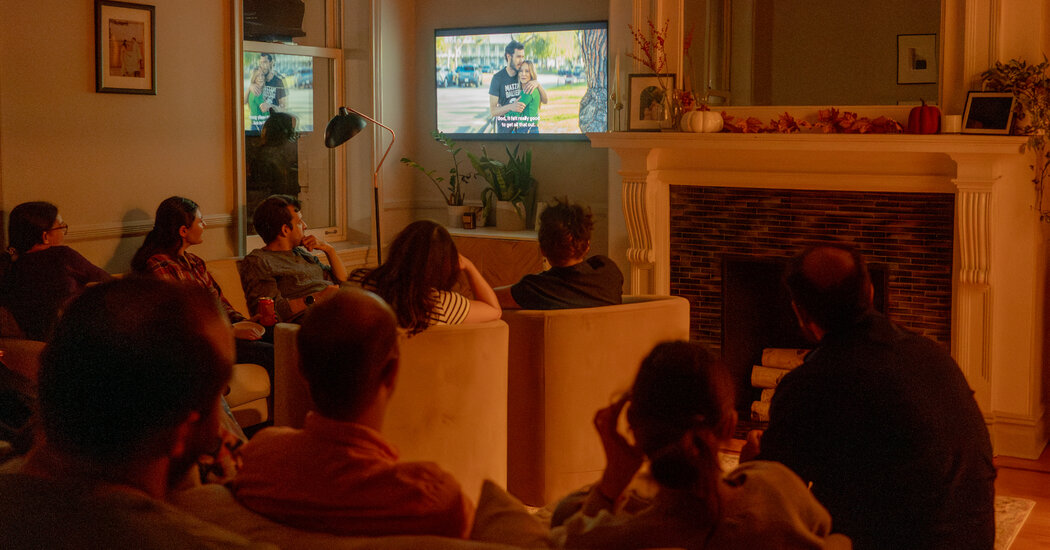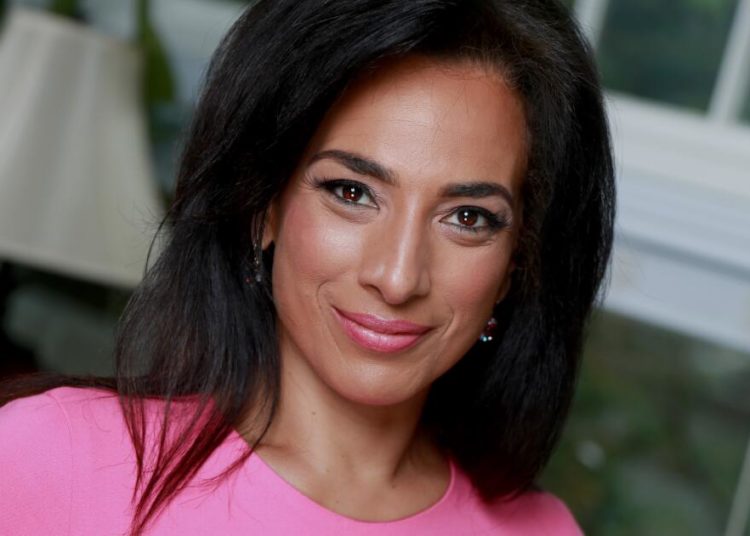Last week, Rabbi Danny Stein welcomed a group of 20- and 30-something Jews to his living room on the Upper West Side of Manhattan, where he regularly holds Torah study, to analyze the Netflix series “Nobody Wants This.”
“It’s not a sacred text,” Rabbi Stein said. “But it’s certainly something that is worthy of Jewish attention.”
Centered on the relationship trials of a young rabbi (Adam Brody) and a podcaster with little exposure to Judaism (Kristen Bell), the first season of “Nobody Wants This” had become a nearly unavoidable topic of discussion in many American Jewish communities since its debut last fall.
It was celebrated as a mainstream television show that highlighted the beauty of Jewish ritual, dissected for its commentary on intermarriage and critiqued for how it represented Jews and their religious practice. It also made the phrase “hot rabbi” go viral.
Having invited an audience to watch the premiere of the show’s second season, which began streaming in full last week, Rabbi Stein opened with a brief rabbinical teaching about the power of words to “create worlds.” It was perhaps the first time that Abraham Joshua Heschel, the 20th-century rabbi, would be put in conversation with this particular rom-com, he acknowledged.
But after watching the Season 2 premiere, the group’s discussion turned to the main critique of the show’s first season: its portrayal of Jewish women. Rabbi Stein asked the 15 or so attendees to move to one side of the room if they felt the show portrayed Jewish women positively and another if they felt it did not. The results were divided, and a reflective discussion followed about characters that some critics had described as rooted in negative stereotypes.
“I almost wonder what it would be like to watch the show in a Jewish bubble, where no one else in the world sees it,” one attendee, Cassie Perez, said. “Would we be laughing, like, ‘My grandma’s like that; my mom’s like that’?”
After the release of Season 1, a succession of online commentaries asserted that the show plays into stereotypes of the overbearing, judgmental Jewish mother and the frigid, controlling wife — especially in contrast to the fun-loving, freewheeling non-Jewish podcasting sisters (played by Bell and Justine Lupe) who suddenly destabilize their social order. The subject drew out complex feelings from Jewish viewers, some of whom were charmed by the show — and accepted that comedy often invites exaggeration — but felt irked by the portrayals, particularly of the rabbi’s mother and sister-in-law.
“The Jewish women in Season 1 were there to tie down the male characters,” as Emma Gray, a journalist who has examined the show on her podcast, “Rich Text,” put it later by phone. “And suddenly you have these two blonde sisters whose arrival was meant to free them.”
Among the most pressing questions surrounding Season 2 has been whether the show could win over its critics — not only the professional ones but also those who debated the topic in groupchats and at Shabbat dinners.
Not everyone agrees that there was a problem to fix. The show’s creator, Erin Foster, who converted to Judaism and based the plot loosely on her courtship with her husband and podcast with her sister, has rebutted the criticism. “It’s so rare to have a beautiful Jewish story on a mass commercial scale,” she told The Hollywood Reporter recently, “that to focus on something and decide it’s problematic to Jews just felt very shortsighted to me.”
Still, the show was open to collecting feedback. Jenni Konner, one of two showrunners who stepped in for the second season, invited her own rabbi, Sharon Brous, to have lunch with the writers as they worked on the new season. (Foster, who oversaw the first season, remains heavily involved as a writer and an executive producer.) The show has had Jewish writers and rabbinical consultation from Season 1 on, but Rabbi Brous brought additional perspective.
“I told them that their job is to be comedy writers,” Rabbi Brous recalled, speaking later by phone. “And yet we are living through a moment in which there is a very dangerous and concerning spike in antisemitism around the world.”
They had the responsibility, she added, of “representing Judaism on one of the largest platforms available.”
Rabbi Brous said she found the first season’s portrayal of Jewish women to be “cringeworthy,” and the depiction of Jewish practice lacking. She offered insights in the meeting into religious strictures around Shabbat and the festive holiday of Purim, which was featured prominently in Season 2.
“I could tell they really wanted to get this right,” Rabbi Brous said.
(Netflix declined to make Konner or Bruce Eric Kaplan, the other new showrunner, available for interviews. Konner told Vanity Fair that the writers had not shaped this season in response to any criticism.)
In Season 2, the two Jewish female characters who were most heavily scrutinized had clear moments of softening. Esther (Jackie Tohn), who is the sister-in-law of the hot rabbi, Noah, had been one of the fiercest opponents of the relationship between Noah and Bell’s character, Joanne. This season, Esther becomes something of a guide in Joanne’s search for a foothold in the family.
And while Noah’s mother, Bina (Tovah Feldshuh), remains hostile toward the prospect of a non-Jewish daughter-in-law, she agrees to open her weekly Shabbat dinner to Joanne.
With the family’s resistance diminished, the central conflict of the show becomes more internal: Will Joanne feel called to convert to Judaism? And if not, will Noah embrace an interfaith relationship?
The debate among viewers picked up where it left off. In starting a daily newsletter about the season, Lior Zaltzman, of the Jewish parenting website Kveller, called the premiere “another Jewish holiday of sorts.” Synagogues have scheduled watch parties and discussions. In Chicago, the show has inspired programming for interfaith couples.
At the home of Rabbi Stein, whose Jewish community organization is known as Base Upper West Side, some of the chatter centered on the issue of authenticity. Did that accent, that character, that scene of religious observance feel authentic? Speaking to the group, Rabbi Stein steered away from that line of thinking.
“There’s so many different ways Jews look, Jews act, how Jews are in relationships,” he said. “All sorts of different ways that we interact in the world and live in the world.”
In reviews of Season 2, some critics who once castigated the show’s portrayal of Jewish women have written approvingly of the added depth the show’s writers gave to Esther, who gets her own substantial side plot. (“I’m not always mad,” she insists amid an identity crisis, “I’m also very fun!” — a wink, perhaps, to the public dissection of her character.)
Allison Josephs, an Orthodox Jewish educator who had major qualms with Season 1, said the Jewish references in this season came off like trivia at times. But she appreciated flashes of meaningful religious teachings, such as Rabbi Noah’s interpretation of “ayin tovah” — Hebrew for “good eye” — as a way to look at one’s partner in a favorable light.
Less favorable views of the new season remain. Some see the interpretations of Jewish identity to be overly simplistic. (The show “still struggles with its Jewish women,” Judy Berman wrote in Time, while also calling out the conspicuous absence of discussion about the Israeli-Palestinian conflict.) Others have resumed fact-checking the show’s Judaism.
But that’s not to say they aren’t having fun.
“It feels actually very innately Jewish to talk and discuss and kvetch and criticize a piece of art that is portraying Judaism in a certain way,” Molly Tolsky, the editor of Hey Alma, a feminist Jewish culture site, said. “And I think people enjoy doing it.”
In one scene of “Nobody Wants This,” Joanne is quick to warm to that part of Judaism.
“A religion that encourages me to argue?” she says. “Love that.”
Julia Jacobs is an arts and culture reporter who often covers legal issues for The Times.
The post ‘Nobody Wants This’ Is Back. So Is Jewish Debate Over Its Depictions. appeared first on New York Times.




